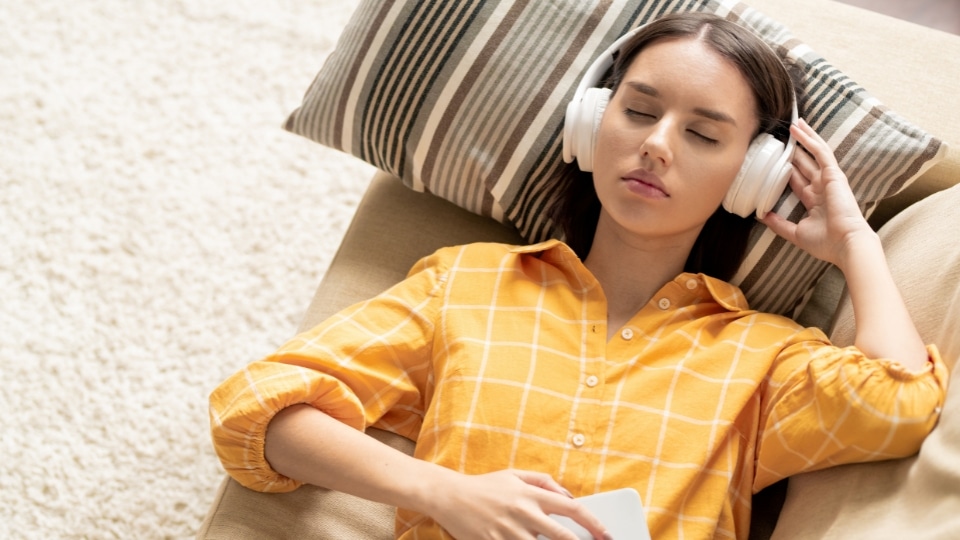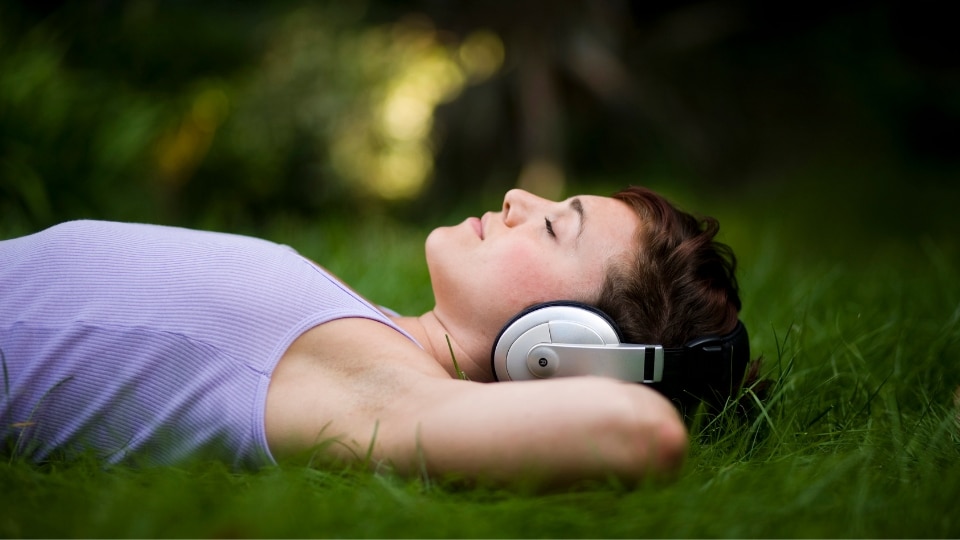Introduction
Healing music for sleeping has become a critical tool in promoting a good night’s sleep, which is vital to overall health and well-being. In our increasingly hectic and digitally connected world, quality sleep is more challenging than it once was. An increasing number of people worldwide are grappling with sleep deprivation and sleep disorders, which can lead to a myriad of health issues, both mental and physical.
That makes exploring and employing effective strategies for better sleep all the more important. One such strategy, gaining traction for its natural and non-invasive approach, is using healing music for sleeping. This concept utilizes specific types of music known to induce relaxation and promote sleep. This article delves into the world of healing music, exploring its benefits for sleep, its science, and how you can incorporate it into your sleep routine.
Understanding Healing Music

As the term implies, healing music promotes healing, relaxation, and well-being. Often utilized in various wellness practices such as yoga, meditation, and therapeutic massage, it can also be highly effective for enhancing sleep quality.
Healing music encompasses various musical styles, from ambient sounds of nature to instrumental melodies and specific sound frequencies known as binaural beats. Despite the diversity, all forms of healing music share a common goal: to create a calming environment that eases stress and promotes relaxation.
When used for sleep, healing music operates on the ‘auditory entrainment‘ principle. That is how the music, with its rhythmic patterns, guides the brain towards slower, sleep-friendly brainwave activity. The brain naturally slows by matching the tempo and rhythm of slow, calming music, helping the listener unwind and drift into a peaceful sleep.
In the following sections, we will delve deeper into the science behind healing music for sleeping and explore some of the most effective healing music for promoting quality sleep.
The Science Behind Healing Music for Sleep
Research has given substantial weight to the power of music in aiding sleep. It’s not just a matter of personal preference; there’s genuine science underpinning the soothing effect of music on our brains, mainly when promoting better sleep.
The fundamental principle behind the impact of healing music on sleep lies in the science of sound waves and brain waves. Our brain naturally mimics or “syncs” with the rhythm of sounds it hears, a phenomenon known as ‘brainwave entrainment.’ When we listen to slower, more relaxing music or sounds, our brain activity slows down, promoting relaxation and easing the transition into sleep.
Several studies have demonstrated this effect. For instance, a study published in the Journal of Sleep Science & Research found that participants who listened to relaxing music before bed experienced better sleep quality than those who didn’t. The music effectively decreased heart rate, eased anxiety, and facilitated a quicker transition to deep sleep.
Furthermore, another research paper in the journal Neural Plasticity reported that certain types of sound stimulation, specifically “pink noise” (similar to white noise but with balanced, steady energy across all frequencies), can enhance deep sleep and memory in adults.
In the next section, we will explore different types of healing music, each with its unique way of promoting restful sleep. Whether it’s the gentle lull of classical music, the rhythmic hum of white noise, or the pulsating tranquillity of binaural beats, there’s a form of healing music to suit everyone’s sleep needs.
Top 5 Types of Healing Music for Sleeping
Music is a diverse and personal experience; the same goes for healing music designed to help us sleep. Here, we’ll introduce five popular types of healing music that you might consider incorporating into your bedtime routine:
1. Classical Music:
Noted for its structured cadence and calm melodies, classical music can be a powerful sleep aid. Pieces with a slow tempo, such as the works of composers like Erik Satie or Claude Debussy, can help reduce stress and anxiety, preparing your mind for sleep.
2. Nature Sounds:
Sounds of the natural world, such as rain falling, ocean waves, or a rustling forest, can induce relaxation and peace. These consistent, ambient sounds help distract our minds from daily stresses and create a serene atmosphere conducive to sleep.
3. White Noise:
White noise is a consistent sound that emits evenly across all hearable frequencies. It reduces the contrast between background sounds and “peak” sounds, like a door slamming or a car horn, that might interrupt your sleep.
4. Binaural Beats:
This involves listening to two slightly different sound frequencies, one in each ear, which your brain perceives as a single, unified tone. Research suggests that binaural beats can induce brainwave frequencies associated with different stages of sleep.
5. Delta Wave Music:
Delta waves are the brainwaves your mind produces during deep sleep. Music designed to mimic these waves can help listeners reach this restful state more quickly.
As personal as our music preferences are, so are our responses to different types of healing music for sleep. Experimenting with these various forms of music will allow you to discover what works best for you and your sleep needs. The following sections provide tips on effectively incorporating this healing music into your sleep routine.
How to Incorporate Healing Music into Your Sleep Routine

Incorporating healing music into your bedtime routine is a simple and enjoyable process. Here are some practical tips to help you reap the full benefits:
- Establish a Consistent Routine: Consistency is vital when it comes to sleep. Try to go to bed and wake up at the same time each day, and incorporate your chosen healing music into this routine. Over time, your brain will associate music with sleep, enhancing its effectiveness.
- Choose Your Preferred Type of Healing Music: There are various types of healing music. Experiment with each type to find the one that helps you relax most effectively. A mix of several types may work best for you.
- Opt for Continuous Play: Select music or sounds that can play continuously for at least the time you plan to sleep. That will prevent any abrupt silence from potentially disturbing your sleep. Many sleep-focused music apps offer continuous play features.
- Control the Volume: Healing music for sleep should be played comfortably. Too loud and it may prevent sleep; too quiet and it might not be effective. Find a volume level that feels relaxing and isn’t disruptive.
- Use Quality Equipment: Use a quality speaker or headphones designed for sleep to ensure the best sound experience. Some headphones are specifically designed to be comfortable to wear while sleeping.
- Utilize Digital Platforms and Apps: Some digital platforms and apps offer a wide range of healing music for sleep. Apps like Calm, Sleepy Sounds, and Noisli allow you to explore different types of healing music, create custom mixes, and set playback for a designated sleep duration.
Incorporating healing music into your sleep routine can be a game-changer in your quest for better sleep. Consistency is critical, and finding the correct type of healing music for your preferences is crucial. Give it a try, and you may be drifting off to dreamland more efficiently than ever.
Summary
In the hustle and bustle of modern life, achieving quality sleep can sometimes feel like an uphill battle. However, using healing music for sleeping presents a natural, enjoyable, and effective solution to this widespread problem. With its roots in solid scientific principles and various styles, healing music caters to each listener’s unique needs and preferences.
We’ve explored the science that underpins the power of healing music, from the concept of brainwave entrainment to research demonstrating its efficacy. We’ve highlighted different types of healing music for sleep, including classical music, nature sounds, white noise, binaural beats, and delta wave music. Lastly, we’ve shared practical tips on incorporating this therapeutic tool into your bedtime routine.
The beauty of healing music lies in its simplicity and versatility. It invites you to experiment, explore, and ultimately find what works best. Whether it’s the soothing sound of a distant rainforest, the steady hum of white noise, or the hypnotic rhythm of binaural beats, there’s a world of healing music waiting to escort you into the realm of restful, rejuvenating sleep.
FAQs About Healing Music for Sleeping
Healing music for sleeping is designed to promote relaxation, reduce stress, and improve sleep quality. It includes a variety of musical styles and sounds, such as classical music, nature sounds, white noise, binaural beats, and delta wave music.
Healing music works on the principle of ‘auditory entrainment‘, where the brain matches its rhythm to the rhythm of the music. When we listen to slower, more relaxing music, our brain activity slows down, promoting relaxation and making it easier to fall asleep.
The effectiveness of different types of healing music can vary from person to person. Some people might find classical music or nature sounds most relaxing, while others might respond better to white noise or binaural beats. Experimentation can help you find the type of music that works best.
You can incorporate healing music into your sleep routine by playing it simultaneously each night as part of a consistent sleep schedule. You can play the music continuously throughout the night using an app or a digital platform that offers a wide range of healing music.
Yes, several studies have demonstrated the benefits of music for sleep. For instance, research has shown that listening to relaxing music before bed can improve sleep quality, decrease heart rate, reduce anxiety, and facilitate quicker transitions to deep sleep.
Absolutely. Healing music can be part of a comprehensive sleep hygiene routine, including strategies like maintaining a regular sleep schedule, keeping your sleep environment dark and cool, avoiding screens before bedtime, and practising relaxation techniques like meditation or deep breathing.
Share Your Experiences
As you embark on your journey towards better sleep with healing music, we invite you to share your experiences. Have you discovered a particular type of music that works wonders for you? Do you have any tips for newcomers to this practice? Please share your thoughts and suggestions with us and become part of a community striving towards better sleep and overall well-being.
Please explore our website for valuable insights, resources, and tips on healthy sleep habits. Sleep is not just a routine; it’s a pillar of health, and we’re here to support you every step of your journey towards better sleep.
For More Insights, Explore Our Other Articles
Calm Rainy Night: Gentle Ambient Music And Rain Sounds For Peaceful Sleep
The Ultimate Guide To Sound That Puts You To Sleep Instantly
How Can Meditation Sleeping Sounds Help You Sleep Better?
